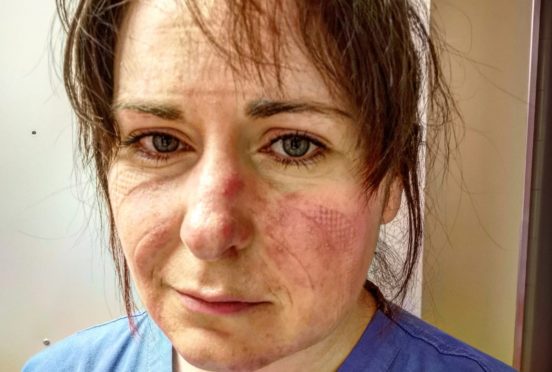
In a weekly dispatch, an intensive care doctor charts the brutal reality of NHS Scotland’s war against Covid-19.
As I peel off the mask for the last time and head to our hand-over meeting my face is louping with pain.
A long run of 13-hour shifts in the ICU has taken its toll.
Initially my face felt as though I’d been on a long cycle on a sunny day, that satisfied mix of sunburn and weather-beaten, but over the last four days that’s now given way to just pain and discomfort.
The skin over my nose is broken and that under my eyes abraised, and I look more like a boxer than a doctor. My lips are swollen and cracked, my mouth dry, my head is thumping.
The normal coffee at the hand over is replaced by half a litre of water, but it makes little difference to my parched mouth, and I refill my bottle.
The personal protection equipment (PPE) masks initially felt quite comfortable and reassuring, but now they only bring pain, the only relief being the constant stream of work and patients.
It’s funny how being busy has become the best analgesic.
The mask sits tightly and painfully around my nose and mouth and the claustrophobic breath pulls the mask in as I breath in, relaxes as I breath out.
I give the elastic one an extra, painful pull tight. The louping pain is a small mercy compared to contracting Covid-19. We are still short of PPE and have issues with masks, adequate eye protection, and visors. There are minimal stock of these and we are washing and reusing them despite them being single use.
We use PPE on a sessional basis so once it’s on it can be good for up to four hours or more. We only change it when we leave the ICU – except for visors. Some of us are keeping one for a full 12-hour shift. This week has been hard, work is continually busy, but isolation is starting to bite at home and everyone is bored and grumpy, missing the things they love, the treats, the excitement that was normal life but on reflection was a luxury we never appreciated.
With the Prime Minister in ICU and with a likely mortality rate in ICU of greater than 50%, people are finally beginning to see Covid-19 for what it is – an invisible, fast-moving, non-discriminating killing machine.
Our country and daily life are a long way from knowing hardship. The memories from the Second World War and its fallout are now isolated in the memories of the few elderly now in hiding at home.
Our world has become forgetful and lonely, but most of all lacking kindness. This episode may have changed that forever.
The mountain of volunteers that have started this week, the stories of community support and the gestures we are seeing in the hospital.
Most days gifts of food or supplies arrive with kind words and well wishes, It is these small acts of kindness that drive me back to the unit every day. I pull the mask back on.

Enjoy the convenience of having The Sunday Post delivered as a digital ePaper straight to your smartphone, tablet or computer.
Subscribe for only £5.49 a month and enjoy all the benefits of the printed paper as a digital replica.
Subscribe